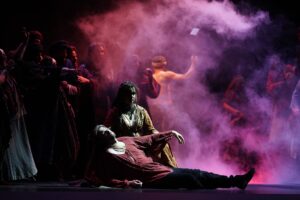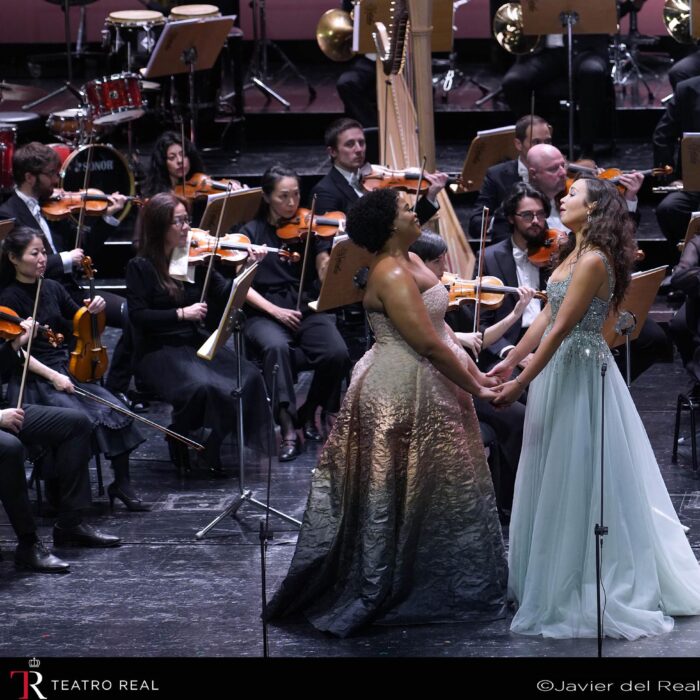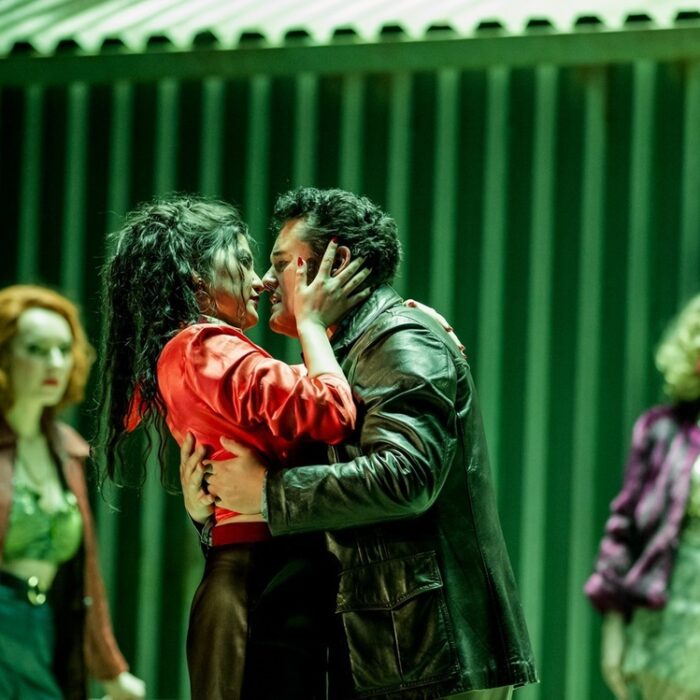
Teatro Nacional de São Carlos Review 2022-23: Il Trovatore
Catia Moreso Triumphs in Role Debut in Season’s Final Production in Lisbon
By Ching Chang(Photo: ©António Pedro Ferreira)
An exciting production of Verdi’s “Il Trovatore” closed the 2022-23 season of Lisbon’s Teatro Nacional de São Carlos this past week, bringing a fitting conclusion on a high note to the challenging tenure of Elisabete Matos as the Artistic Director of Portugal’s premier opera house.
Rendered in a lively staging by Stefano Vizioli, Maestro António Pirolli led the singers, chorus and the musicians of the Orquestra Sinfónica Portuguesa in a lustrous reading of Verdi’s score, an opera which for better or for worse has remained in the wider public’s conscience as among the most beloved and identifying of the entire genre.
With sets by Alessandro Ciammerughi and beautifully lit by Fabio Rossi, this production took a conservative approach, yet managed to avoid the heavy baggage of tradition. True, perhaps no one can theatrically salvage the very final scene of Trovatore, with the “egli era suo fratello” revelation, but as far as the rest of the opera, stage director Stefano Vizioli’s willingness to flesh-out the humanity of characters and take some risks paid off handsomely.
This was by no means modern staging filled with symbolic abstractions; but with inventive and attractive sets, Vizioli populated the production with a youthful and energetic cast of free-wheeling Andalusian gypsies juxtaposed against the non-descript austerity of Aragonese courtiers, creating interactions that felt very real, transcending operatic clichés about Italian opera.
Elegant Singing All-Around
Musically, one often associates a good “Trovatore” experience to an exercise in exhibitionistic vocal feats, with large corpulent voices executing acrobatic cadenzas, and fat juicy fermatas parked interminably on the applause-trap of high notes.
But Antonio Pirolli, whose masterful fluency with this type of repertoire has been amply demonstrated previously at the São Carlos, decided instead upon an obedient solution that allowed this resourceful cast to shine elegantly in their best light, and I felt this was the right approach.
For instance, “Tu vedrai che amor in terra,” an aria that is often cut as the bane of many heavy voiced sopranos, Portuguese soprano Cristiana Oliveira’s more modest-sized soprano dispatched the bravura multi-octave cascading sequences with excellent control and efficiency. As a tender, youthful looking Leonora, Oliveira sings the melting, ascending phrases of the prima donna arias with a beautiful vocal bloom, with cadenzas that were proper and well contained, tastefully avoiding vocal histrionics that might have exposed any shortcomings.
Similarly, Russian tenor Ivan Gyngazov’s Manrico had excellent physique du role, looking every bit as gritty and rough as a rebellious anti-establishmentarian agitator. An excellent actor, Gyngazov may not have the robust Italianate sound some may expect for Trovatore, but he offers plenty of thrilling intensity and vocalism for the role.
Also, Italian baritone Alessandro Luongo captured the menace and danger Conte di Luna conveys, even when the character mellows out for his moonlit ballad, “Il balen del suo sorriso.” But his edgy baritone shone particularly well in the swashbuckling Act one trio (ending with an almost convincing sword-fight) or his almost lurid delivery of the duet with the pleading Leonora, fueled by sheer vocal testosterone.
The unquestionable star of the evening, however, was the world-class Azucena of Portuguese mezzo soprano Catia Moreso, who in her outstanding prise-de-rôle had an unqualified triumph. A frequent performer at the São Carlos, many regular house patrons often feel that Moreso is perhaps too prolific in her choice of repertoire, but if that’s indeed the case, this Azucena certainly shows this artist in a role genre type that Moreso clearly has mastered. She created a unique imprint with her hypnotic, pungent delivery of “Stride la vampa,” and the urgency in her protagonism within the various duets and ensembles, Moreso offered visceral stage-worthy characterizations both luscious and vocally powerful.
Critical to the success of the evening were also the contributions of excellent young Portuguese singers in choice supporting roles afforded by Il Trovatore: soprano Joana Seara (Inez), bass Dario Russo (Ferrando) and tenor Sergio Martins (Ruiz).
Beyond individual efforts, the vibrant singing of the opera chorus at Teatro São Carlos, prepared by chorus master Giampaolo Vessella, showed that they have an easy affinity with Verdian style, and together with the orchestra, were part of the glue that elevated the artistic legitimacy of this final production of the season.
A Nice Farewell
This is the last full stage production of TNSC under the charge of Artistic Director Elisabete Matos, who had a turbulent four-year tenure severely impacted by the difficult planning and logistical constraints imposed by the pandemic directives of the Portuguese Republic’s Council of Ministers during restriction years. There were many situations beyond her control, and yet for which she was also unduly criticized, so it is reassuring to see that she was able to conclude her final year with a production worthy of this splendid, historical opera house.
In anticipated legislative elections last year, Matos was elected as an assembly member to the Portuguese parliament for her home district of Braga, but stated at the time that she would only serve in the assembly after she concludes her directorship at São Carlos. The association that oversees the opera house appointed last month the Dutch opera director Ivan van Kalmthout as the new artistic director for the 2023-24 season (part of which has already been planned).
Van Kalmthout will face a new set of challenges, when the historic opera house will close for the next two seasons when it undergoes major renovations. It will be incumbent upon the Dutch director to convincingly oversee his first couple of seasons at Portugal’s premier national opera company, while productions are mounted in assorted stages and unconventional spaces around town.



